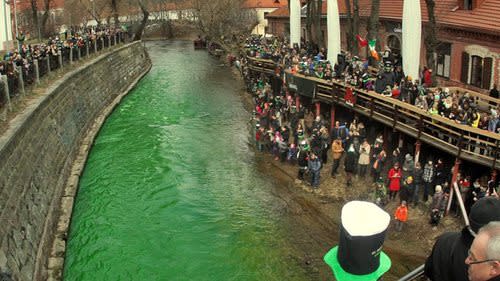St Patrick’s Day has become a cringeworthy festival of consumerism

Let me start off by stating, to be absolutely clear, that I am not trying to knock the Irish here. I have the utmost affection and respect for Ireland and its people.
I am also proud of my own Irish heritage, even if it does mean that I am physiologically unsuited to any climate other than a predominately wet, windy and overcast one.
Magical memories of childhood visits to the Emerald Isle have imbued me with - among other things - a lingering love of the smell of burning peat.
So much so that I have even gone as far as importing hand-cut turf from Donegal to my home in London just so that I can enjoy the nostalgic aroma from time to time.
And when I listen to Fields of Athenry, a folk song that tells the story of a husband put on a prison ship to Australia after steeling corn to feed his starving family during the Great Famine, I am rarely left without a tear in my eye (both of pain and shame).
I also used to think the pride shown on St Patrick’s Day was one of the most wonderful things, especially when contrasted with less celebrated national festivals like St George’s Day.
But as the years have worn on I have become ever more fed up of Ireland’s national day being turned into a crass and consumerist spectacle.
When the Vilnia River in Lithuania’s capital – where there is not and never has been an Irish diaspora – is turned green in its honour (pictured), you know the day has lost more than a little meaning.
Such celebrations are a little more natural here in Great Britain, where six million people – one in ten - have at least one Irish-born grandparent.
Yet tonight you can still expect thousands of revellers with no discernable connection to Ireland to be wearing giant, tacky, shamrock-emblazoned hats sponsored by Guinness, while getting their annual taste of the “black stuff” in emerald-bedecked pubs in even the most uniformly British parts of the country.
But it was the Americans who can mostly be blamed for turning a proud national day into a naff orgy of boozing and tat that has been embraced by the world.
The country is the lynchpin of the diaspora. More Irish emigrants settled there than anywhere else, with the number of arrivals averaging 457,000 a decade in the century between 1830 and 1930.
Yet, since the Great Depression ended this wave of immigration, Irish-Americans’ link with their motherland has become one based more on myth.
These myths – most ruinously the drinking all day and fighting all night one – is in danger of becoming universally accepted.
And I dread the day when I hear St Patty – how Americans frequently refer to St Patrick – being uttered on this side of the Atlantic.
For heaven’s sake, Patty is short for Patricia – and, if the snake-banishing saint’s name has to be shortened at all, it should be St Pat or St Paddy.
The idea of Irish people being permanently jolly, leprechaun-like folk with simple wit also aggrieves me because clever, biting humour is a much more common trait.
The Irish, who have given the world the greatest literary accounts of misery, deserve much better than a commercialised glee-fest to mark their tremendous contribution to the world.
Having said that, I can understand why you might prefer to head out and drink green lager than sit at home reading Dubliners or Angela’s Ashes.
So, whatever your reasons for celebrating, I will (while cringing at the prospect of seeing lurid vomit on the pavement tomorrow) wish you all a happy St Patrick’s Day!

 Yahoo News
Yahoo News 
